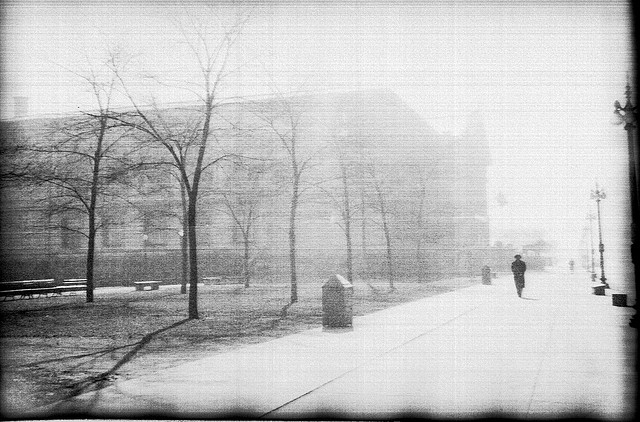Edward Hirsch: Poems for my father(s)
By Robin Amer

Edward Hirsch: Poems for my father(s)
By Robin Amer
The poet Edward Hirsch was born in Chicago in 1950, and many of his poems are haunted by little glimpses back into that old city of his youth. In the 2008 poem “Cotton Candy,” for example, Hirsch is again a small boy, walking with his grandfather over one of Chicago’s many bascule bridges:
We walked on the bridge over the Chicago River
for what turned out to be the last time,
and I ate cotton candy, that sugery air,
that sweet blue light spun out of nothingness.
It was just a moment, really, nothing more,
but I remember marveling at the sturdy cables
of the bridge that held us up
and threading my fingers through the long
and slender fingers of my grandfather,
an old man from the Old World
who long ago disappeared into the nether regions.
And I remember that eight-year-old boy
who had tasted the sweetness of air,
which still clings to my mouth
and disappears when I breathe.
There is pain here, but also tenderness, and maybe even a little nostalgia — a recognizable combination where the subject matter is childhood and family.
As an adult, Hirsch won the Lanvan Younger Poets Award from the Academy of American Poets and the prestigious Rome Prize, as well as fellowships from the MacArthur and Guggenheim foundations (the latter of which he now chairs) and the National Endowment for the Arts.
But Hirsch’s future success was not necessarily forecast by his Chicago childhood. Early on Hirsch was burdened by a biological father, his “first father” as he calls him in one poem, with poor boundaries and cruel attachments. In one poem, Hirsch depicts Harold, nicknamed “Ruby,” talking openly to his young children about his sexual preferences and his frustration with their mother’s “frigidity.” Ruby then left the family when Edward was a still a child, an event Hirsch writes about in “My Father’s Back”:
There’s an early memory that I carry around
In my mind
like an old photography in my wallet,
little graying and faded, a picture
That I don’t much like
but nonetheless keep,
Fingering it now and then like a sore tooth,
Knowing it there,
not needing to see it anymore…The sun slants down on the shingled roof.
The wind breathes in the needled pines.
And I am lying in the grass on my third birthday,
Red-faced and watchful
but not squalling yet,
Not yet rashed or hived up
from eating the wrong food
Or touching the wrong plant,
my father’s leaving.
And yet, Hirsch was also cared for by his “other father” – the man who raised him. He writes about this father with the great longing of a grown-up son who has just lost his parent in “Early Sunday Morning”:
Give me back my father walking the halls
of Wertheimer Box and Paper Company
with sawdust clinging to his shoes.Give me back his tape measure and his keys,
his drafting pencil and his order forms;
give me his daydreams on lined paper.I don’t understand this uncontainable grief.
Whatever you had that never fit,
whatever else you needed, believe me,my father, who wanted your business,
would squat down at your side
and sketch you a container for it.
Of channeling these feelings and memories into his work Hirsch said, “I became, I’d say, addicted to this idea: That you could take the muck and mire of your own life, you could take the messy things in your own life, the difficult experiences you didn’t understand, and try to turn them into something.”
“And the idea that you could turn them into something that you thought was beautiful? That seemed noble to me. I aspired to that,” Hirsch added.
The poet gave a reading in Chicago in April, and read several poems that touched on these two men in his young life. You can hear his reading in the audio above.
Dynamic Range showcases hidden gems unearthed from Chicago Amplified’s vast archive of public events and appears on weekends. Edward Hirsch spoke at an event presented by the Society of Midland Authors in April of 2013. Click here to hear the event in its entirety.
Robin Amer is a producer on WBEZ’s digital team. Follow her on Twitter @rsamer.